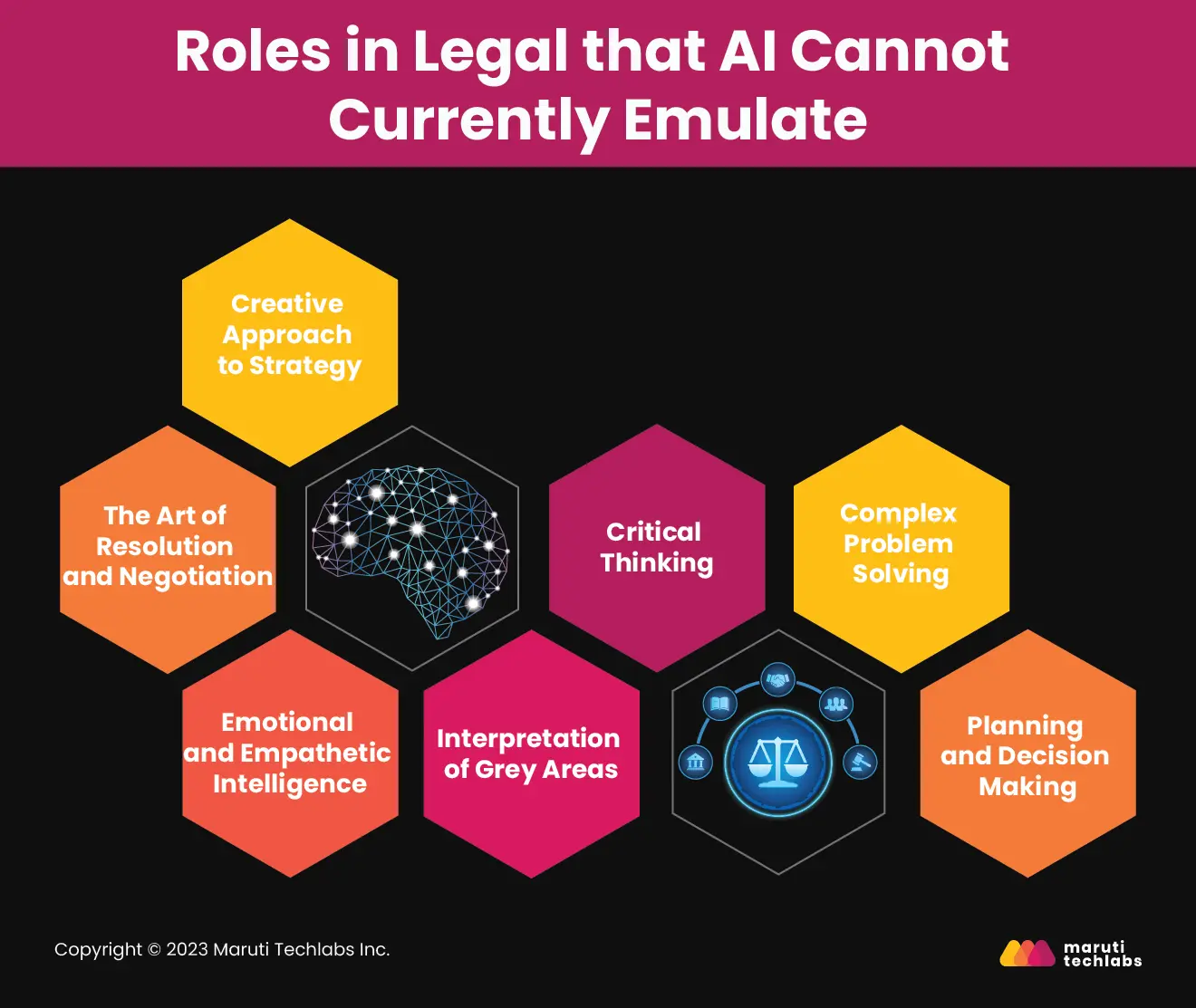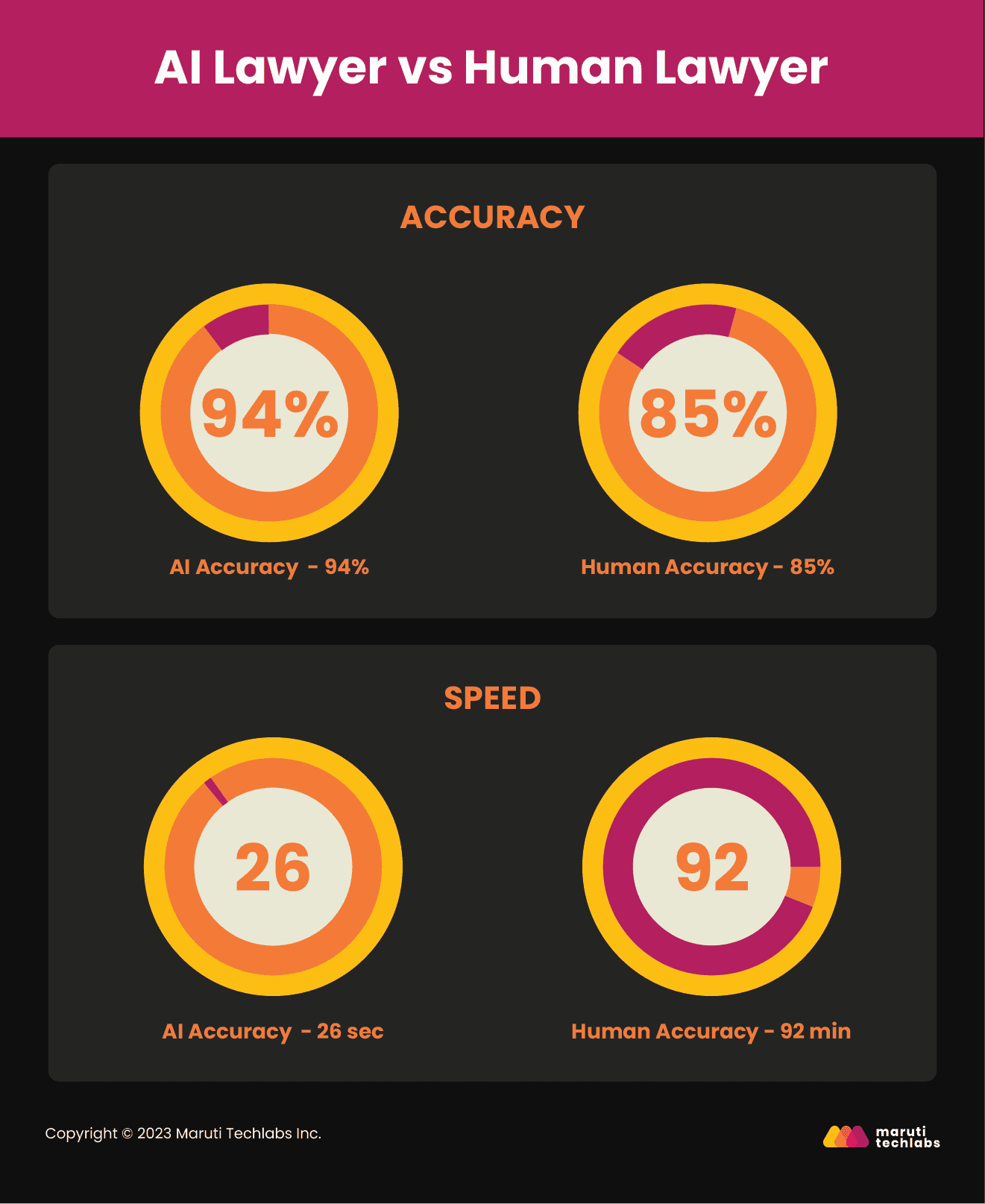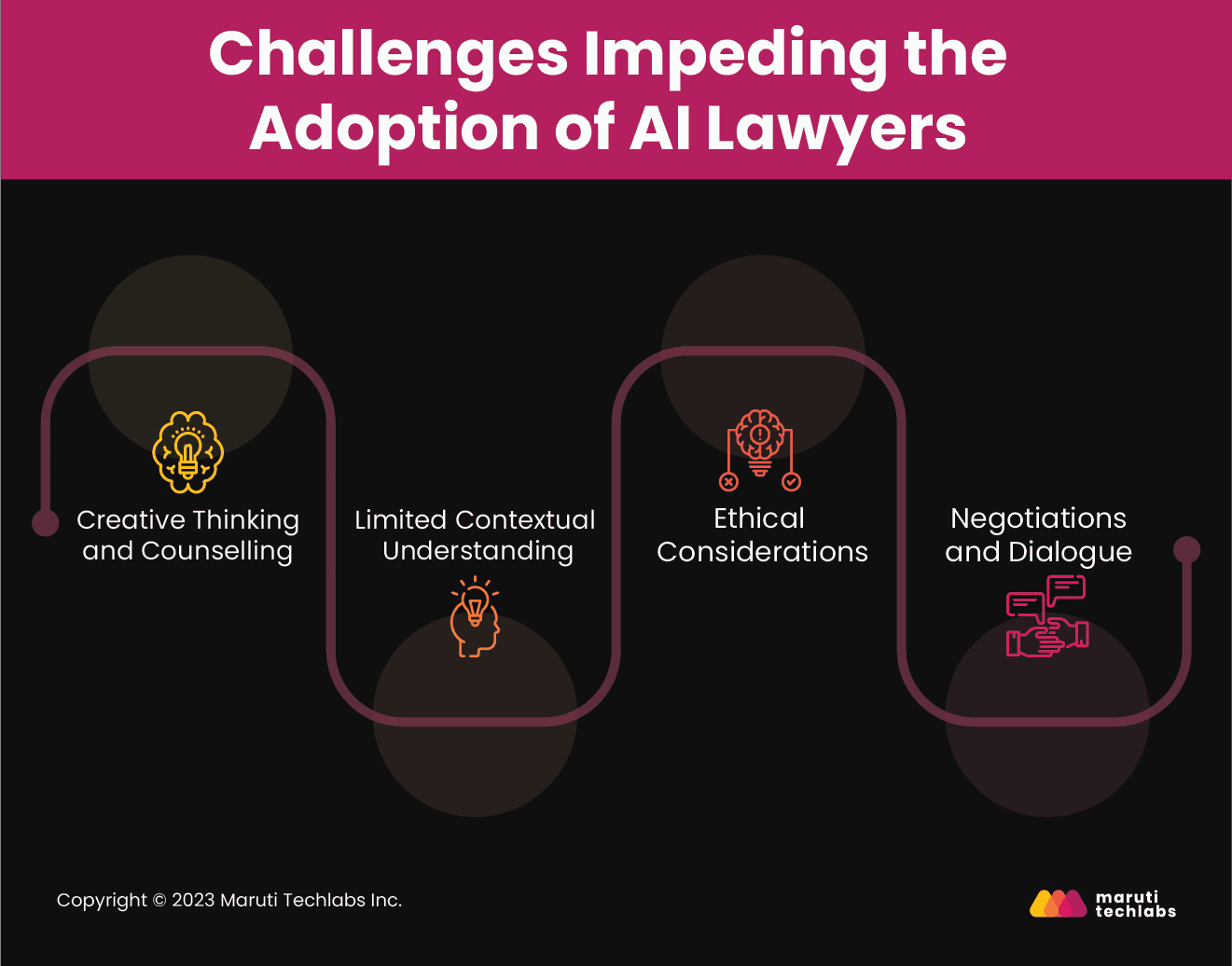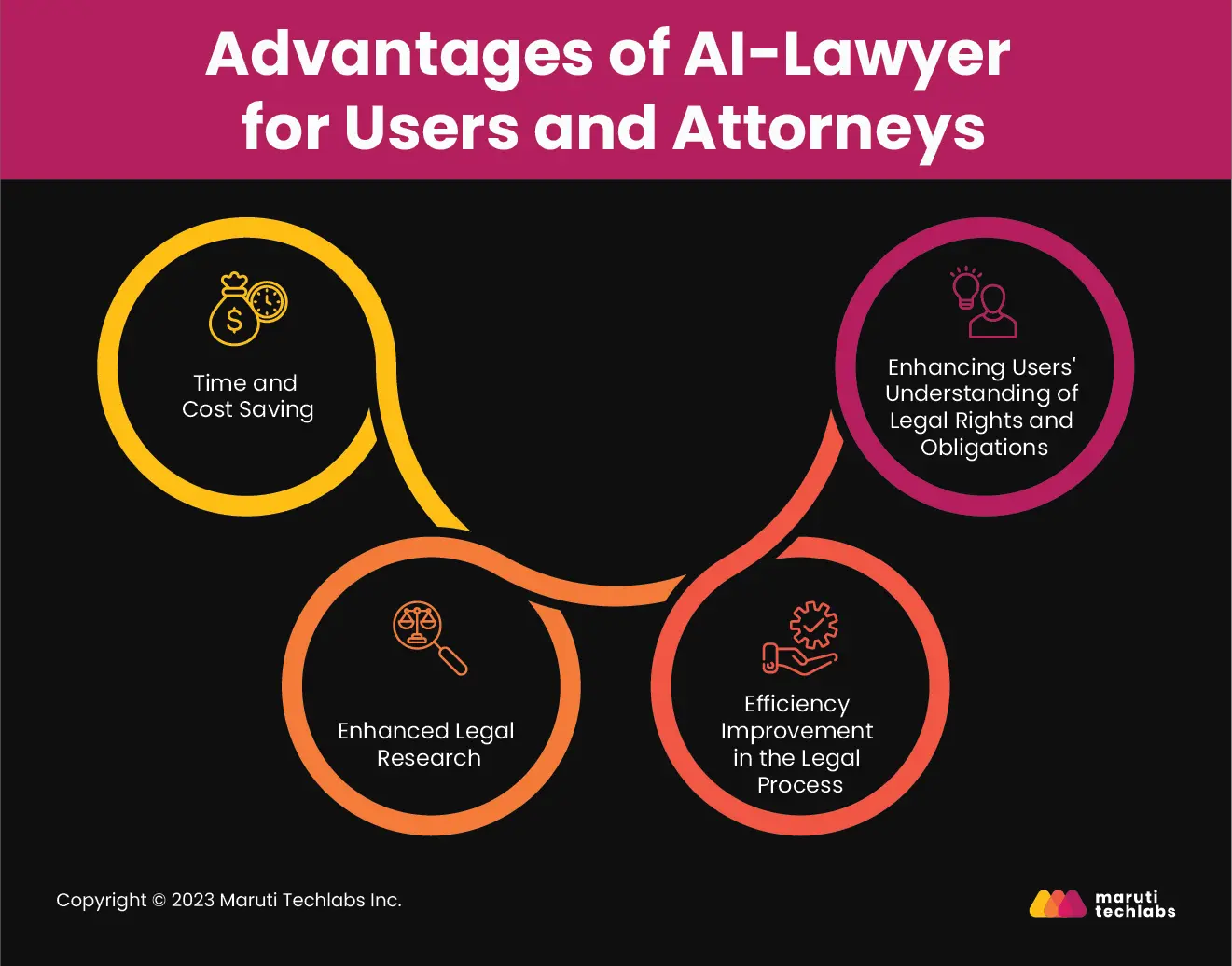

AI for Lawyers: Can AI Robots Defend a Human in Court?






A Goldman Sachs report revealed that Artificial Intelligence (AI) could replace 300 million full-time jobs with automation. Advanced AI tools have consistently demonstrated efficiency, accuracy, and speed across various domains, including the legal domain.
AI-powered services are transforming legal research, document analysis, case prediction, and more. AI for contract review is widely used by attorneys and lawyers worldwide. With this rapid technological progress, a pressing question that looms over the legal landscape is: Will AI replace lawyers?
The impact of technology on law is reminiscent of the growth of e-commerce. Though the widespread development of e-commerce platforms didn't entirely eradicate brick-and-mortar stores, it did instigate a profound metamorphosis in the retail sector, which resulted in better service and higher customer satisfaction.
Similarly, the advent of AI lawyers would usher in an unavoidable paradigm shift within the legal domain. Automating repetitive, rule-based tasks, the AI lawyer streamlines cumbersome legal processes and helps achieve unparalleled speed and accuracy.
So, will lawyers be automated with AI Robot lawyers replacing human lawyers?
No. The ultimate goal of AI in the legal space is not to replace human lawyers but to empower attorneys to deliver superior legal services.
AI has undoubtedly created a seismic shift within the legal profession. Despite these ground-breaking shifts, there remain distinct roles in which human lawyers excel, and AI struggles to emulate.
The intricacies of legal practice often necessitate interpretation, contextual understanding, and empathy. This underscores an indispensable need for the nuanced expertise, experience, and creative problem-solving skills that human lawyers bring.
Here are a few key areas where the unique qualities of human lawyers shine, emphasizing the indispensable human touch in law practice.

The human mind can ‘think outside the box.’
Legal issues often require more than just a straightforward application of rules. They demand innovative approaches to navigate the complexities of the law. Human lawyers bring a level of strategic thinking to the table. They can foresee potential outcomes, anticipate counterarguments, and craft novel solutions.
AI is a powerful tool for processing vast amounts of data. However, evolving lawyer technology needs more intuitive and creative thinking to address legal challenges dynamically.
Conflict resolution and negotiation are the cornerstones of a lawyer’s expertise.
Successful resolution of conflicts transcends a mere understanding of legal precedents. It demands a deep understanding of human dynamics, emotions, and the art of compromise. Human lawyers excel at reading the subtleties of a situation, adjusting their strategies, and cultivating relationships conducive to effective negotiation.
AI struggles to capture the nuances of human emotions and interpersonal dynamics. The AI lawyer thus fails to replicate the finesse of human negotiations and conflict resolutions.
While AI excels at facial recognition, understanding nuanced facial cues eludes it.
Humans possess a remarkable knack for precisely interpreting emotional subtext. Human lawyers employ emotional intelligence and empathy in interactions with clients, witnesses, and opposing counsel. These interpersonal skills help build trust, understand client needs, and represent them effectively.
While AI lawyers can efficiently process tons of information, they need help comprehending emotionally charged aspects of legal contexts. Thus, the human touch of empathy remains an irreplaceable element in legal practice.
AI lawyers function well when presented with quantifiable data. However, there are many "gray areas" within the intricate field of legal practice. These involve emotions, ethical considerations, and subjective interpretations.
Human lawyers excel in interpreting these gray areas, drawing on legal expertise, contextual understanding, and the ability to apply nuanced reasoning.
AI, reliant on programmed algorithms and predefined rules, struggles when faced with ambiguity. It lacks the capacity for subjective interpretation and contextual adaptation.
Thinking like a lawyer goes beyond knowing the law; it involves cultivating a logical, analytical, and creative approach to problem-solving and finding solutions. Human lawyers can identify critical elements, extract insights, and use them to form persuasive arguments, judgments, and intuitions.
AI lawyers can analyze a document with high accuracy and speed, too. However, they lack the autonomy for independent thinking necessary to make sound decisions and judgments. Nevertheless, AI will assist in legal decision-making with data, facts, and analytics in the near future.
Complex problem-solving necessitates the cognitive understanding of the human brain.
In the realm of legal challenges, effective problem-solving is paramount. Human lawyers can navigate complexities, comprehend intricate reasons, consider unforeseen circumstances, and adapt strategies in real-time.
AI lawyers lack the holistic and adaptive problem-solving approach that characterizes human cognition.
From devising case strategies to meticulous trial preparation, planning demands foresight and adaptability. These are currently beyond the capabilities of AI. The human capacity to foresee, adapt, and prioritize remains a distinctive strength in planning.
While AI excels in specific tasks and processes, it needs help to emulate human-centric planning. It lacks the adaptability, intuition, and a deep understanding of contextual intricacies that play pivotal roles in planning.
In reflection, it is evident that AI has significantly reshaped the legal terrain. However, amidst these advancements, certain fundamental human qualities stand irreplaceable. The capacity for strategic thinking, emotional intelligence, and the ability to navigate ambiguity are essential facets of legal practice where human lawyers shine.
AI lawyers are no replacement for human attorneys, at least not yet!
However, there are several areas in the legal realm where legal technology surpasses humans in terms of accuracy, speed, and efficiency. Law firms using Artificial Intelligence reported significant improvement in reviewing contracts, analyzing texts, extracting summaries, or predicting outcomes.
The former assistant general counsel at Microsoft, Lucy Bassli, said, "When five paralegals review contracts, each approaches it in five distinct ways. In contrast, AI provides consistent results. The engine applies the same contract rules—pre-approved by a legal decision-maker—in every review."
A 2017 experiment conducted in London also demonstrated the supremacy of AI over human attorneys in terms of predictions. The experiment involved over 100 lawyers with years of experience in legal practice reviewing applications for a specific credit card irregularity. The accuracy of human predictions was 66.3%, while an AI tool could make more rational predictions with 86.6% accuracy.
Not just this. There are several studies showcasing the superiority of AI over human lawyers.
In a recent study, LawGeeks compared the performance of an AI engine with that of human lawyers. This study pitted an AI engine trained to evaluate contracts against twenty US-trained lawyers with extensive legal and contract review expertise.
The International Association for Contract and Commercial Management (IACCM) reported that 83% of businesses are dissatisfied with their contract reviewing process. This underscores a critical demand for a contract review solution that efficiently evaluates thousands of routine contracts daily.
This study aimed to evaluate the efficiency of an AI-based tool for reviewing such contracts. The core task of this study was to review five commercial Non-Disclosure Agreements (NDAs) comprising 153 paragraphs.
Test Instructions
The requirement was "an in-depth review of the legal clauses in the five NDAs." They were to identify and highlight legal issues, including arbitration, confidentiality of relationship, and indemnification. Each participant was scored based on their accuracy in spotting legal matters.
Results

The top attorney achieved an impressive accuracy rate of 94.94%, while the average human score was 84.84%. Notably, the AI achieved a remarkable score of 94.55%, which was at par with the top-performing attorney and significantly higher than the average attorney scores.
Regarding efficiency, the human lawyers took an average of 92 minutes to review all five NDAs. The slowest human lawyer took 156 minutes, while the quickest completed the task in 51 minutes. In stark contrast, the AI engine completed the review process in 26 seconds.
One of the participants, Grant Gulovsen, said, “Attorneys spend so much of their time creating or reviewing documents like NDAs, which are so fundamentally similar to one another.”
These results emphasize that AI surpasses experienced human lawyers in speed, accuracy, consistency, and cost efficiency. It further highlights the legal domain’s tolerance for consistent inaccuracy. This prompts a re-evaluation of concerns about AI integration.
This brings us to the burning question - Is AI the future of law? Are AI-powered robot lawyers a reality? Will an AI robot lawyer walk down the courtroom? Can AI replace a judge?
According to a recent report, 62 percent of legal professionals are not using AI and feel the industry needs more time to prepare for the technology. Thus, despite the rapid progress of AI in the legal field, a notable resistance exists among legal practitioners towards adopting AI lawyers.
Some of these notable challenges impeding the adoption of AI lawyers are -

AI lawyer bots can be beneficial in providing quick and easy legal assistance, but they cannot comprehend complex legal concepts and provide personalized advice. The empathy and understanding necessary for in-person discussions are intrinsic to human attorneys. In addition, lawyers must learn how to chat with AI lawyers to get accurate answers.
AI lawyers solely rely on factual considerations, lacking the indispensable emotional intelligence quotient. It struggles with understanding and interpreting emotions—an essential aspect of human experience that often plays a significant role in legal decision-making. For instance, in legal proceedings related to family law or mental health, this aspect becomes exceptionally crucial.
An AI lawyer faces limitations in representing clients in court and negotiating with other attorneys. They must gain the adaptability, intuition, and real-time decision-making abilities to navigate dynamic legal scenarios. In addition, AI tools also need more creativity and emotional understanding of a case required for appropriate negotiation.
Implementing AI in the legal domain is also limited by ethical considerations, particularly in navigating issues related to bias, accountability, and interpreting complex legal nuances. Before implementing this technology, lawyers must be taught - ‘What ethical considerations should lawyers keep in mind when using artificial intelligence for legal research?’
Despite facing constraints in the legal realm, the progress of technology for lawyers is undeniable. 95% of individuals already using AI reported saving considerable time each week on their legal work. The leading use case for AI in the legal profession is around document reviewing, summarizing, and drafting.

Legal tasks like research, review, or drafting take much of a lawyer's billable hours. AI lawyers can find relevant case law and regulations at the click of a button. This can save considerable time, resulting in reduced costs and improved productivity.
Legal research is akin to finding a needle in a pile of hay. It often involves tons of paperwork. An AI lawyer can leverage advanced algorithms to scour massive legal databases. It can extract critical insights and precedents that support legal arguments. Legal professionals can use this data to build robust legal strategies.
AI is making huge strides in document review, legal research, and contract analysis. Automation in legal processes and advanced data processing of AI improve the efficiency of legal procedures and enable legal professionals to focus on more strategic and intricate aspects of their work.
AI lawyers can be crucial in empowering individuals with the correct legal knowledge. The law field is vast; most people must know their legal rights and obligations. This often results in ambiguity, fear, misconceptions, and potential fraud.
AI lawyers can simplify complex legal concepts and provide personalized legal assistance. Real-time updates and interactive Q&A can help individuals navigate legal complexities with greater clarity and confidence.
The ongoing discourse around AI in law underscores the strengths and limitations of modern law firm technologies, thus signifying the importance of collaboration between AI and human attorneys.
While the AI lawyer can take over labor-intensive and repetitive tasks, like document research, review, and drafting, human attorneys and lawyers can engage in more creative and constructive endeavors like establishing a case, understanding emotional contexts, and strategizing their arguments. Thus, the optimal strategy emerges in the collaborative synergy between human lawyers and AI.
In the ever-evolving legal landscape, Maruti Techlabs provides state-of-the-art AI services that catapult legal practices into the future and ensure a competitive edge in the industry. With a comprehensive understanding of the intricate and complex legal landscape, we stand uniquely positioned to pioneer innovative legal tech solutions.
To determine your firm’s preparedness for AI-driven transformation, start with our AI Readiness Assessment Tool—designed to help you evaluate current capabilities and uncover strategic opportunities.
Our commitment to innovation is evident in developing a revolutionary AI medical record summarization tool that our adept AI developers fine-tune for the medicolegal landscape.
Get in touch with our AI Experts at Maruti Techlabs.


